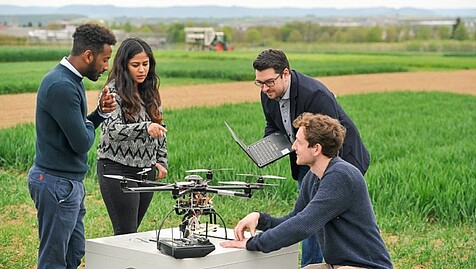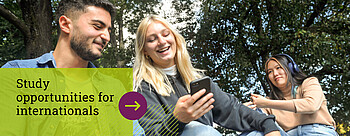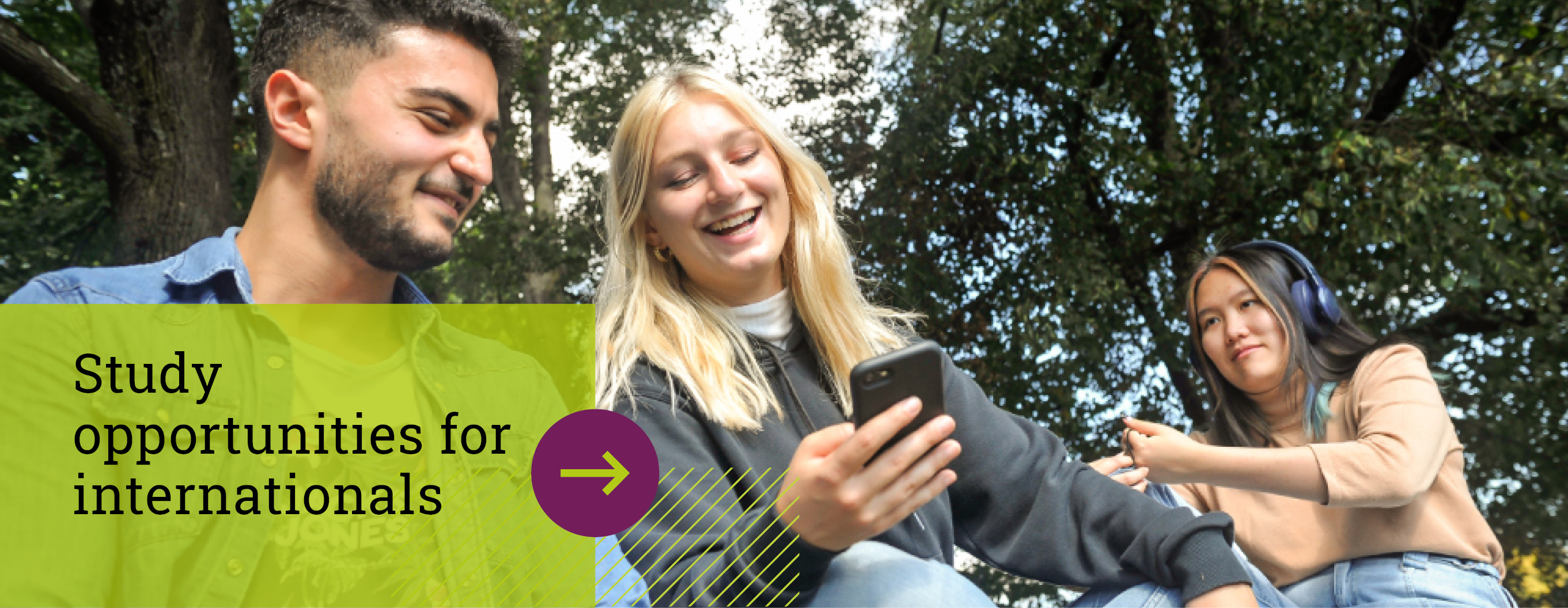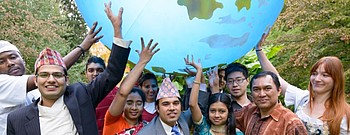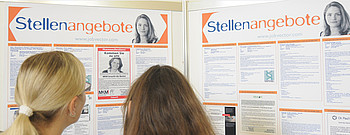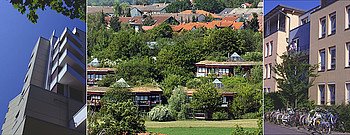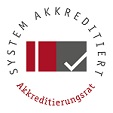Environmental Protection & Agricultural Food Production (Master’s)
Experts for sustainable environmental protection
Environmental Protection & Agricultural Food Production (Master’s)
Experts for sustainable environmental protection
How can we feed the world's population without depleting natural resources for future generations? One of the greatest challenges of the future is how to intensify food production with environmentally friendly and sustainable production systems. That is why this broad Master’s program was developed with many different opportunities for creating an individual profile.
- International studies with a specialization in sustainability and environmental protection
- Consideration of ecological, economic, political, and administrative contexts
- Diverse career opportunities in national and international companies
- Reasons to Choose Hohenheim
| Degree Master of Science (M.Sc.) |
4 semesters 120 credits |
Language English |
University places unlimited |
Location Stuttgart |
|||||
More information about the individual modules can be found in the module descriptions.
In your first year, you will complete five compulsory modules that provide in-depth knowledge of environmental modeling, environmental economics, quantitative methods, and GIS software, as well as four semi-elective modules from a wide range of Master's modules offered by the Faculty of Agricultural Sciences.
In the second academic year, you can choose five elective modules from a large catalog of subjects. The academic program advisors from among the instructors will advise you on your choice of modules and how to plan your degree program to ensure a smooth and direct process.
The Master's thesis is also completed in the second academic year according to your choice of specialization.
In this degree program, you will acquire the following knowledge and skills:
- Analyzing and understanding the economic, political, and administrative interactions within agroecosystems
- Acquiring knowledge of physical, biological, and chemical properties of environmental chemicals to determine what happens to them and their impact on the environment
- Developing models for environmental systems, carrying out simulations, and analyzing the results
- Analyzing geodata using geographic information systems
- Developing integrative, global problem-solving approaches
You can find information on the individual modules in the module descriptions.
Graduates will acquire the knowledge and skills necessary to:
- analyze and understand ecosystemic, economic, political, and administrative interdependencies
- understand physical, chemical, and biological properties of agents and matter in order to identify their impact on the environment
- set up models for environmental systems, conduct simulations and analyze the results
- analyze spatial data with geographical information systems
- develop integrative problem solutions on a global scale.
Interesting and individual career prospects
Graduates of this degree program have the tools to analyze and understand ecosystemic, economic, political, and administrative interrelationships and to develop integrative solutions to problems.
You are particularly qualified for the following areas of work:
- Environmental and quality management in companies and organizations • Consulting offices for agriculture and environmental protection
- Environmental and agricultural authorities
- Research and development for international companies and organizations
- Research institutions
Here you can see some examples of our graduates’ careers.
In addition, the Master's program qualifies students to embark on a doctoral project. Most universities as well as most graduate schools expect above-average performance in the Master's program for this.
Janet Rotich (graduate of 2013, Kenia), Regulatory Affairs Assistant-Medical devices at SCC – Scientific Consulting Company GmbH
 “Envirofood is an up to date program that takes into consideration the current challenges affecting the world, from climate change to sustainable food production.
“Envirofood is an up to date program that takes into consideration the current challenges affecting the world, from climate change to sustainable food production.
The program prepares students to work in inter disciplinary fields in the areas of sustainable development, climate change, food production and quality assurance.
I would recommend EnviroFood to students looking for a multidisciplinary international course in the beautiful town of Stuttgart.”
Gisela Quaglia, (graduate of 2016), Argentina, Research Programme Officer at the European Commission, Brussels
 “EnviroFood's core modules increased my passion for applied environmental solutions and empowered me to look for ways to reduce agricultural impacts. Students learn to critically assess agricultural problems from different angles, i.e., the environmental, economic and social aspects.
“EnviroFood's core modules increased my passion for applied environmental solutions and empowered me to look for ways to reduce agricultural impacts. Students learn to critically assess agricultural problems from different angles, i.e., the environmental, economic and social aspects.
My desire to contribute positively to sustainable agriculture lead me to continue in a PhD program for which, EnviroFood gave me the tools required to start the next step in my professional career.”
Jamie Smidt, (graduate of 2014), USA, "Karlsruhe Institute of Technology (KIT), Institute of Meteorology and Climate Research, Scientific Research Assistant
 “EnviroFood centers around a strong core curriculum of well-organized and interesting classes in agricultural and environmental sciences. In addition to compulsory classes, students can choose elective modules, customizing so the master’s program to their individual interests. The majority of my courses were highly relevant and thought provoking. My classmates and I are now working a variety of positions in diverse industries. EnviroFood prepared us well for careers both in and outside academia.”
“EnviroFood centers around a strong core curriculum of well-organized and interesting classes in agricultural and environmental sciences. In addition to compulsory classes, students can choose elective modules, customizing so the master’s program to their individual interests. The majority of my courses were highly relevant and thought provoking. My classmates and I are now working a variety of positions in diverse industries. EnviroFood prepared us well for careers both in and outside academia.”
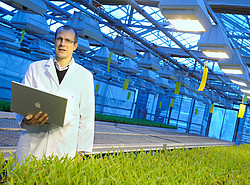
Good reasons to study at the Faculty of Agricultural Sciences in Hohenheim
First Place not Once but Three Times: The current Global Universities Ranking from U.S. News & World Report, the renowned NTU ranking, QS World University Ranking, and dathe Center of World University Ranking put University of Hohenheim’s agricultural research in 1st place in Germany.
In the agricultural university ranking from top agrar, the agricultural students at the University of Hohenheim give the grades 1.5 to 2.0. According to the ranking 2016, 88% of the students surveyed would recommend the University of Hohenheim for agricultural studies.
The University of Hohenheim puts great importance on quality teaching, which is demonstrated by several award-winning reform projects.
These projects include for example mobile teaching (German e-learning innovation and young scientists award (d-elina) in the category “Campus” at the BITKOM) or the ethics module, developed by the student group FRESH and awarded by the UN.
With long-term experience in carrying out large interdisciplinary projects on agricultural-ecological topics worldwide, Hohenheim offers ideal circumstances for students who want to gain hands-on experience as well as theoretical knowledge.

The vision of the Faculty of Agricultural Sciences is a global agricultural system which is productive, environmentally-friendly and socially-minded, and which is in harmony with society’s demand for a multi-purpose orientation.
Agricultural research at the University of Hohenheim is focused on four areas:
- Food for all: Security of global food supply
- Hazard prevention: Climate change and scarcity of resources
- Beyond fossil fuels: Bioenergy and bio-based value-creation networks
- Diversity instead of monoculture: Genome Diversity in Agriculture
There are no easy answers to these kinds of questions. That is why agricultural researchers at the University of Hohenheim work across disciplinary boundaries, collaborating with colleagues in the natural sciences, business administration and economics, and the social sciences, for instance in bioeconomics, a field of research and teaching that will become even more important in the future. That collaboration also has an impact on teaching.
Number 1 in internationalization: In the current EU ranking U-Multirank, the University of Hohenheim has a top spot in internationalization.
The basis for this placing is the decades-long, global commitment of the Agricultural Sciences. Especially our tropics research with 10 professorships has made the University known around the world.
International opportunities for students:
- 80 partner institutions worldwide (40 of which are in the Erasmus+ program)
- Member of the Euroleague for Life Sciences - the network for Europe’s best
- scholarship programs for travel, research, and exchange
- Worldwide alumni network
- Studies according to international standards for excellence and international competitiveness of graduates
Professors of the Faculty of Agricultural Sciences are in high demand.
The top experts include:
 | Chair of the scientific advisory council Prof. Dr. Martina Brockmeier The German Council of Science and Humanities is considered the highest-ranking advisory committee on topics of science in Germany. Its scientific members are appointed by the Federal President. |
 | In the Bioeconomy Council Prof. Dr. Regina Birner The Bioeconomy Council is an independent advisory committee for the German federal government. The goal: to establish a cross-sectoral and bio-based economy in Germany that uses as few fossil raw materials as possible. |
Further members in important commissions and expert lists
- Prof. Dr. Iris Lewandowski and Prof. Dr. Joachim Müller are members of the BMBF scientific advisory council "Agricultural Systems of the Future”
- Prof. Dr. Enno Bahrs is member of the BMEL scientific advisory council for biodiversity and genetic resources
- Expert lists on various agricultural topics

Scholarship and awards for studies, final theses, travel, and attending conferences: Thanks to many supporters, the University of Hohenheim has an unusually extensive scholarship culture.
Around 100,000 Euros is the total amount of all scholarships and awards that are presented each year at the Dies academicus.
More than 700 hectares of test area: Among German universities, the University of Hohenheim owns the largest amount of property. For students, this means a lot of room for their own experiments, research, and a great deal of hands-on experience.
Also directly on campus: State institutes for transferring science into practice, the Hohenheim Gardens, and the German Agricultural Museum.

The University of Hohenheim is a university with a long tradition. You will experience a truly unique university atmosphere enriched by the Baroque palace, the historic gardens and parks, and modern architecture: In 2009, the University of Hohenheim was declared the most beautiful campus university in the state.
In 2017, Hohenheim's President Stephan Dabbert was chosen by the German Association of University Professors and Lecturers (DHV) as the most popular president in Baden-Württemberg for the third year in a row. He was ranked second in all of Germany.
This jewel is located south of the state capital Stuttgart. Because it is close to Stuttgart, you have all the opportunities available in a big city. The University of Hohenheim is only a few minutes away from the airport, the Stuttgart Trade Fair Centre, and the autobahn and is easily reached with public transportation.
 | Unique party atmosphere: The historical Thomas-Müntzer-Scheuer, an old barn with a new purpose, is the party center of Hohenheim. |
 | The University ball in the pompous palace rooms is the social event of the year. |
Because of the freedom you have in designing your last year of studies, credits earned during a semester abroad can be easily recognized as elective modules. This means that spending time abroad will not typically extend the amount of time you need to complete the program.
You can also complete your Master's thesis abroad.
The Faculty of Agricultural Sciences engages in research and teaching cooperation with 80 partner institutions worldwide, 40 of which are part of the Erasmus+ program.
The University of Hohenheim’s Office of International Affairs offers information and advising on stays abroad and how to finance them through scholarships.
| Start of the application period |
|---|
| Non-EU citizens: Mid-November of the year before the program starts German, EU citizens: Mid-April |
| Application deadlines | |
|---|---|
| 1st subject-related semester | Only possible for the winter semester! German, EU citizens: 15 September Non-EU citizens: 15 March |
Higher subject-related semesters | For the winter semester: All applicants: 15 January |
| Requirements | |
|---|---|
| Formal requirements |
|
| Content requirements | We require good knowledge of English and computers as well as the ability and willingness to work in intercultural teams. |
| Language skills | English language proficiency required |
| Pre-study internship | no |
| Selection procedure | |
|---|---|
| Selection criteria | None, the number of places is not limited However, an above-average average grade in the Bachelor’s program as well as a suitable previous degree program are admission requirements. If the final grade or grade point average of this degree is not above average, special aptitude for the degree program can be proven if necessary (for details see Admission Regulations § 4). For details, see the Admission Regulations (german | english). |
| Selection interview | no |

